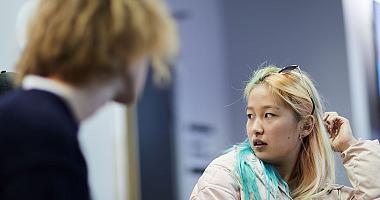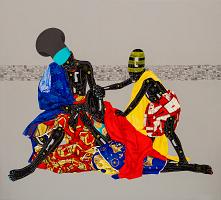MA Filmmaking (Cinematography)
Content navigation menu
Why study MA Filmmaking (Cinematography) at Goldsmiths
If you are passionate about pursuing a career as a cinematographer in an environment that promotes innovative filmmaking, this programme is for you.
-
The MA Filmmaking (Cinematography) is a pathway of the Goldsmiths MA Filmmaking. It is housed in a new purpose-built media facility with state-of-the-art teaching spaces including film and photography studios equipped with Arri cameras and lighting.
-
It is a unique blend of hands-on workshops, studio and location filming exercises, and high production value collaborative film projects, the MA elevates your skills as a moving-image storyteller to the level of Director of Photography.
-
You'll learn sophisticated camera, lighting and gripping techniques, and will perform all camera department roles from director of photography to camera operator, focus-puller, gaffer, camera assistant, spark and grip.
-
You’ll work on a number of exercises and films per term in your specialist role, culminating in a major film production towards the end of the degree.
-
The programme will prepare you to enter the global job market, armed with an enhanced understanding of your practical, intellectual and creative capacities as a cinematographer.
-
Media, Communications and Cultural Studies at Goldsmiths has been ranked second in the UK for 'world-leading or internationally excellent' research (Research Excellence Framework, 2021) and 16th in the world (third in the UK) in the 2024 QS World Rankings for communication and media studies.
Contact
If you have specific questions about the degree, contact Femi Kolade.
Length
1 year full-time
Entry requirements
You should have (or expect to be awarded) an undergraduate degree of at least 2:2 standard in a relevant/related subject. You might also be considered if you aren’t a graduate or your degree is in an unrelated field, but you have relevant experience and can show you can work at postgraduate level.
Fees
Home - full-time: £17000
International - full-time: £32000
School
What our students say
“I won the NAHEMI Best Cinematography award at Encounters International Short Film Festival for my Goldsmiths graduation film. Yet, before enrolling on the MA, I had little previous experience of cinematography. I knew I was fascinated by cinematography and I understood that lighting, in particular, was a painstaking skill."
“Since I graduated from the MA, things have gone really well. So far this year, I've done 19 short films and two feature films, one of which was picked up at Cannes. It’s all a bit manic and I have no social life, but I love it!”
“I always used to think of filmmaking as a craft, but after making my graduation film, my vision has shifted and I am now convinced that filmmaking is truly an art. It’s not just about planning sophisticated camera moves or complex editing; it's about linking creative techniques to tell a powerful story in ways that people can experience for themselves and literally ‘feel’.”
What you'll study
You will take the following modules:
| Module title | Credits |
|---|---|
| Cinematography: Specialist Skills | 60 credits |
| Final Project | 60 credits |
Your final project will be assessed by a portfolio of work and a viva that reflects your practice.
Note about optional modules (if available): The above is indicative of the typical modules offered, but is not intended to be construed or relied on as a definitive list of what might be available in any given year. The module content and availability is subject to change.
Overview
For two terms you will spend a full day a week in specialised contact with your specific programme convenor. These sessions include:
- Practical demonstrations and exercises
- Lectures
- Screenings
- Small group seminars
- Workshops
You will also take three optional modules, taught through practical workshops and hands-on experiences, as well as critical discussion and essay writing.
The third term will be taken up with your substantive Final Project and you will take part in a series of progress and feedback meetings.
Group film projects
You will work with other students from across the five MA Filmmaking fiction pathways to create film crews in a professional structure.
This allows you to develop realistic industry experience while making work with extremely high production values.
Entry requirements
You should have (or expect to be awarded) an undergraduate degree of at least second class standard in a relevant/related subject as well as a level of practical experience from work in the arts or the media.
You might also be considered for some programmes if you aren’t a graduate or your degree is in an unrelated field, but have relevant experience and can show that you have the ability to work at postgraduate level.
Because funding deadlines and requirements vary around the world, applications are considered on a rolling basis from February onwards and places on the programme fill up across the recruitment cycle. For this reason, we strongly advise you to submit your completed application as early as you can.
International qualifications
We accept a wide range of international qualifications. Find out more about the qualifications we accept from around the world.
If English isn’t your first language, you will need an IELTS score (or equivalent English language qualification) of 7.0 with a 7.0 in writing and no element lower than 6.5 to study this programme.
How to apply
Apply directly to Goldsmiths using our online application system
You apply directly to Goldsmiths using our online application system.
Before submitting your application you’ll need to have:
- Details of your academic qualifications
- The email address of your referee who we can request a reference from, or alternatively a copy of your academic reference
- Copies of your educational transcripts or certificates
- A personal statement – this can either be uploaded as a Word Document or PDF, or completed online. Please see our guidance on writing a postgraduate statement and ensure that you answer the following questions in your statement:
- Tell us about your passion and aptitude for Filmmaking
- What are your dreams and aspirations?
- How did your engagement with visual media develop, and how has it developed in terms of professional, voluntary and personal work?
- Examples of your recent work in a related field (eg moving image samples), preferably via a web link to your online portfolio – please upload this under 'additional' in your online application (NB the maximum file size you can upload is 20MB)
- IELTS 7.0 at the point of application (if you are from a non-majority English-speaking country)
You should emphasise your practical/theoretical experience in the arts or the media in your application.
You'll be able to save your progress at any point and return to your application by logging in using your username/email and password.
References
Our preference is for referees to upload a confidential reference to the online admissions system. Please make sure to select the option for your referees to be automatically notified of the need for them to submit a reference on your behalf.
When to apply
We accept applications from October for students wanting to start the following September.
Application deadline: 26 May
Applications are considered from February onwards and are only considered when complete; we strongly recommend applying as early as you are able to, as decisions will take longer the later in the year you apply.
We will only be able to consider late applications if there are vacancies remaining. Please note, assessment of MA Filmmaking applications can take several months as there are a limited number of places on the programme. Due to the unique selection process, we ask that all applicants wait to be contacted by the Admissions Team regarding their application.
We encourage you to complete your application even if you haven't finished your current programme of study. It's very common to be offered a place that is conditional on you achieving a particular qualification.
If you're applying for funding and have an early deadline, please apply as early as possible and get in touch to let us know your funding deadline.
Selection process
Admission to many programmes is by interview, unless you live outside the UK. Occasionally, we'll make candidates an offer of a place on the basis of their application and qualifications alone.
Please be aware that this pathway of MA Filmmaking tends to be heavily subscribed, so you are encouraged to apply for more than one pathway to increase your chances of being offered a place. Please indicate in your personal statement your preferred pathway.
Find out more about applying.
Fees and funding
Annual tuition fees
These are the PG fees for students starting their programme in the 2025/2026 academic year.
- Home - full-time: £17000
- International - full-time: £32000
If your fees are not listed here, please check our postgraduate fees guidance or contact the Fees Office, who can also advise you about how to pay your fees.
It’s not currently possible for international students to study part-time under a student visa. If you think you might be eligible to study part-time while being on another visa type, please contact our Admissions Team for more information.
If you are looking to pay your fees please see our guide to making a payment.
Funding opportunities
Explore the Goldsmiths scholarships finder to find out what funding you may be eligible for.
Paying your fees
Find out about paying your tuition fees.
If you are a UK student you may be eligible for a postgraduate loan.
Meanwhile our Careers Service can also offer advice on finding work during your studies.
Additional costs
In addition to your tuition fees, you'll be responsible for any additional costs associated with your course, such as buying stationery and paying for photocopying. You can find out more about what you need to budget for on our study costs page.
There may also be specific additional costs associated with your programme. This can include things like paying for field trips or specialist materials for your assignments. Please check the programme specification for more information.
Student work
Watch the trailer of Lula, an award-winning short film directed by Aoife O'Kelly and produced by Sara Kurp, both MA Filmmaking students.
Short film, Lula
Staff
Course convenor Tania Freimuth is a cinematographer working across award-winning film and high-end television drama, with work streaming on Amazon Prime, BBC iPlayer and Sky. She is also a published photographer, with work exhibited in Paris and London, and an active visual artist and educator.
Tania began her career as a filmmaker, directing music videos for independent bands, most notably The Mock Turtles. She later transitioned into the camera department, starting as a clapper loader and professionally progressing through the grades to become a cinematographer. This hands-on career pathway strongly informs her teaching, offering students practical insight into both creative development and industry practice.
She is a member of the GBCT, Illuminatrix and BAFTA, and a Canon EMEA Pro Ambassador. Narrative fiction lies at the heart of her work, which began in high-end television drama before leading to her first independent feature, shot on Super 16mm film. Her work and approach to cinematography have been featured in British Cinematographer magazine.
Recent projects include Dream Big (dir. Pip Swallow), Little Darlings (dir. Ian Wendell Aryeh), available on NOW TV, Verdigris (dir. Patricia Kelly), winner of Best Independent Feature Film at the Galway Film Fleadh 2023 and nominated for five IFTAs, and the acclaimed documentary The Contestant (dir. Clair Titley), now streaming on Hulu.
Teaching focus: cinematography, visual storytelling, camera and lighting practice, and professional pathways within the screen industries.
Careers
Where this degree can take you
Our graduates
Recent alumni are active in the film, media and cultural industries around the world as:
- Cinematographers
- Film camera operators
- Television camera operators
- Lighting designers
- Focus pullers
- Gaffers
- Grips
- Steadicam operators
Find out more about employability at Goldsmiths.
Skills you'll gain
The programme will prepare you to enter the global job market, armed with an enhanced understanding of your practical, intellectual and creative capacities as a cinematographer. You will also develop a variety of transferable intellectual, organisational and communication skills to equip you for a broad range of employment opportunities across the arts and media landscape.
You'll learn sophisticated camera, lighting and gripping techniques, and will perform all camera department roles from Director of Photography to Camera Operator, Focus-puller, Gaffer, Camera Assistant, Spark and Grip.
Classes in related disciplines such as Directing and Editing will advance your collaborative skills, and by working with those studying all specialisations, including writers, producers and sound designers. The horizontal framework is designed to stimulate collaborative practice by introducing you to a breadth of filmmaking knowledge combined with a high level of expertise as an accomplished cinematographer.





